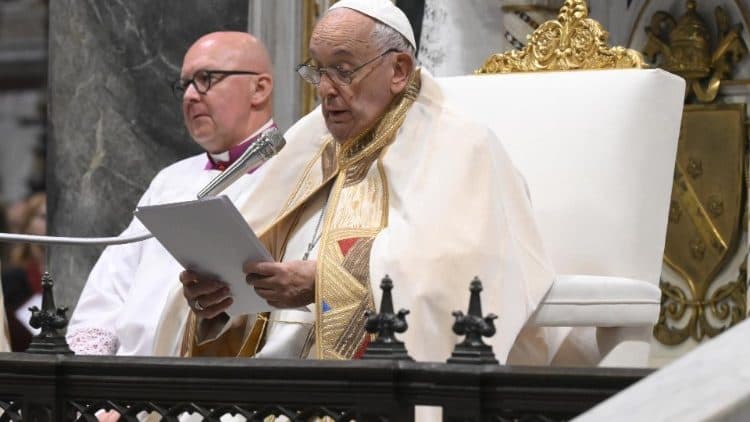ROME – On Sunday’s liturgical Solemnity of Corpus Christi, Pope Francis said God’s presence in the Eucharist is a reminder of his presence in the world and an invitation for the faithful to imitate him in bringing hope to others through loving service.
“Every day we see too many streets that were once filled with the smell of freshly baked bread, but are now reduced to rubble by war, selfishness and indifference,” the Pope said during his 2 June Mass for the Solemnity of the Body and Blood of Jesus, which was <a href="https://catholicherald.co.uk/considering-the-solemnity-of-corpus-christi-through-raphaels-stanza-della-segnatura/?swcfpc=1"><mark style="background-color:rgba(0, 0, 0, 0)" class="has-inline-color has-vivid-cyan-blue-color">celebrated in many countries around the world on 30 May</mark></a>.
“We urgently need to bring back to our world the good, fresh aroma of the bread of love, to continue tirelessly to hope and rebuild what hatred destroys,” he said, instructing the faithful to be “the first ones to take this step”.
On Sunday afternoon, Pope Francis presided over Mass for the Solemnity of Corpus Christi at the papal Basilica of Saint John Lateran in Rome, the event coinciding with Italy’s national celebration of the <em>Festa della Repubblica</em>, marking the <a href="https://catholicherald.co.uk/italys-prime-minister-tells-bishops-to-back-off-over-constitutional-reform/?swcfpc=1"><mark style="background-color:rgba(0, 0, 0, 0)" class="has-inline-color has-vivid-cyan-blue-color">foundation of the Italian Republic in 1946</mark></a>.
After Mass, the Pope led a Eucharistic procession to the nearby papal Basilica of Saint Mary Major, home to the famed Maria Salus Popoli icon, where he gave a blessing with a consecrated host to the crowd below.
During his homily, Francis focused on the image of Jesus breaking and blessing the bread in the day’s Gospel reading from Mark, which recounted the Last Supper.
The pontiff highlighted three aspects that he said are central to Catholic Eucharistic devotion: thanksgiving, remembrance and presence.
He noted that the word “Eucharist” itself means thanksgiving and is a sign of life, making each Mass an opportunity for faithful to bring the successes, failures and events of their daily lives to the altar.
To truly thank God for his gifts, it is important not to “squander” the blessings and talents that one possesses, the Pope said.
He urged the faithful to “forgive and support those who make mistakes and fall because of weakness or lapses, acknowledging that everything is a gift, and nothing should be lost, that no one should be left behind, and that everyone deserves a chance to get back on their feet”.
“We ought to perform our work with love, precision, and care, recognising it as a gift and mission, however humble it may be, and recalling that every good deed is sacred and unique in God’s eyes,” the Pope said, urging believers to give thanks at the end of each day for the good that happened.
Pope Francis said it is small actions like this that allow one to appreciate the significance of the Mass, explaining: “God does not ask for grand gestures; he is pleased with the little we have to offer, if we do so with the joy and humility of those who give thanks.”
He also spoke of the Mass and the Eucharist as a <a href="https://catholicherald.co.uk/jesuss-body-needed-to-be-broken-by-the-soldiers-lance/?swcfpc=1"><mark style="background-color:rgba(0, 0, 0, 0)" class="has-inline-color has-vivid-cyan-blue-color">recollection of the freedom of the Israelites from slavery in Egypt and their journey to the promised land</mark></a>.
It is also a reminder of Jesus’s suffering, death and resurrection, “by which He freed us from sin and death,” the Pope said, adding that Jesus through the sacrifice of his life “not only set us free but also showed us how to live as free men and women”.
“There are some who say that true freedom means thinking only about ourselves, enjoying life [and] doing whatever we want without regard for others,” the Pope said, before cautioning how “this is not freedom but slavery”.
This can be seen, he explained, “in situations where self-centeredness leads to poverty, loneliness, addictions, exploitation and wars.
“In all these cases, we see clearly how selfishness does not bring freedom but rather enslavement.
“Freedom is not found in the security vaults of those who hoard wealth for themselves, nor on the couches of those who lazily indulge in disengagement and individualism,” Francis said.
Instead, he extolled, freedom is found when, motivated by love, someone lowers themselves to serve others, offering one’s life to bring freedom to others.
Pope Francis said the Eucharist is a reminder that Jesus is not a far-off idea, but is real and present among believers.
“[It] speaks to us of a God who is not distant and jealous, but close and in solidarity with humanity; a God who does not abandon us but always seeks, waits for, and accompanies us, even to the point of placing himself, helpless, into our hands, subjecting himself to our acceptance or rejection.”
God’s presence in the Eucharist is also an invitation to be present to others “wherever love calls us”, while urging people to be “close to those who are alone, far from home or in need”.
The Pope said one expression describing a good person is that they are “a piece of bread”, a term he said that refers to “big-hearted individuals who are available, generous, selfless and even willing to sacrifice themselves”.
“This is why God gives himself to us as bread: to teach us, in turn, to be ‘pieces of bread’ for one another,” he said.
Pope Francis said the world is in need of this bread, “which knows about gratitude, freedom and closeness”.
Discussing the Eucharistic procession he would lead at the end of Mass, the Pope said the procession is not done “to show off, or to flaunt our faith but to invite everyone to participate, in the Bread of the Eucharist, in the new life that Jesus has given us”.
“We invite everyone to walk with us, following him with grateful and generous hearts, so that the joy and freedom of the children of God may grow in us and in every person we meet,” the Pope said.<br><br><em>Photo: Pope Francis delivers his homily for the feast of Corpus Christi on 2 June 2024. (Credit: Vatican Media, via Crux.)</em>



